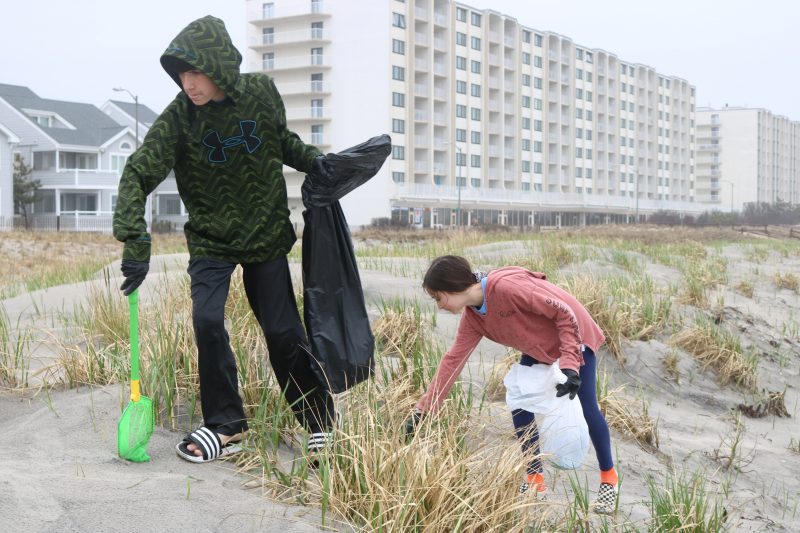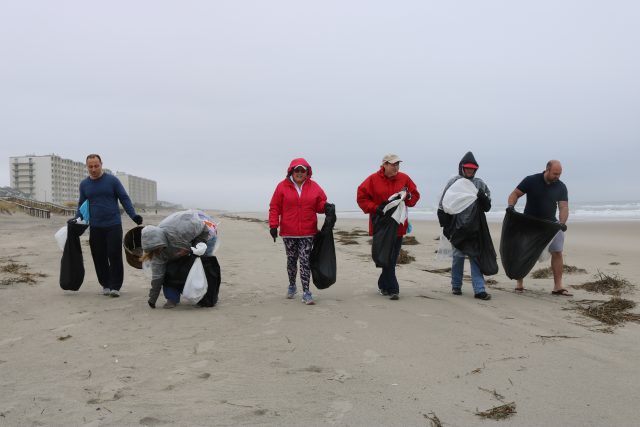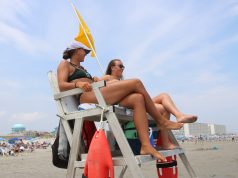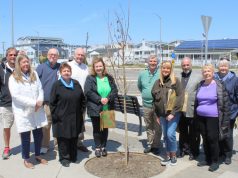By Donald Wittkowski
There was a car tire. And a car windshield.
As for the rest of the car? Well, you’d probably have to go to a junk yard or a used car lot to try to find it. Or maybe it’s at the bottom of the ocean.
The remnants of someone’s car were among the most unusual pieces of trash and other stuff littering the shoreline during Sea Isle City’s community spring beach cleanup on April 13.
A large refrigerator door, large pieces of asphalt and construction materials, such as roof tiles and siding, were also some of the bizarre types of debris removed from the beaches and dunes by more than 160 environmentally conscious volunteers.
In all 6,458 pieces of litter and other trash were picked up, according to a newly released report by the Sea Isle City Environmental Commission.
Discarded plastic items were by far the most common type of junk – 4,474 pieces in all, or 69 percent of the entire load of waste that was removed from the beach during April’s cleanup.
They included plastic bags, bottles, food and candy wrappers, caps and lids and straws. Cigarette filters represented the biggest individual source of plastic waste. Volunteers picked up a total of 1,026 cigarette butts during the cleanup, the report said.
“Based on the data collected and the observations recorded by volunteers, cigarette filters remain a problematic item along the beach and on the dunes,” wrote the report’s author, Maria Andrews, a member of the Environmental Commission who is the associate director of undergraduate programs for the Department of Earth and Environmental Science at the University of Pennsylvania.
Andrews noted that cigarette butts are nonbiodegradable toxic plastics that can release arsenic, nicotine and hydrocarbons into the environment. Those chemicals can also leach out of the cigarette butts and pose “acute toxic effects” to marine life, she added.

The report raises hope that the number of cigarette butts fouling the shoreline will decrease now that New Jersey has imposed a smoking ban on the state’s beaches and parks. The ban began in January.
“This smoking ban will facilitate a decrease in the number of cigarette filters littered on the beach, dunes and their proximity and it will also provide a decrease in the toxic effects triggered by cigarette butts,” the Environmental Commission’s report says.
The commission plans to study the effectiveness of the smoking ban by comparing the number of cigarette butts that were collected during Sea Isle’s beach cleanups before the ban went into effect, and after.
“There is a need to gather further beach cleanup collection data in order to assess the decrease of plastic cigarette filters over time,” the report says.
Twice a year, in the fall and spring, Sea Isle holds the beach cleanup in partnership with Clean Ocean Action, an environmental group. Sea Isle’s cleanup volunteers carefully catalog the types of trash and debris that are found. The information is sent to Clean Ocean Action as part of a statewide database from beach sweeps at shore towns across New Jersey.
Keeping the dunes, beaches and ocean as clean as possible is especially important in the summer season, when throngs of tourists arrive on vacation. Sea Isle wants to make a good impression on the visitors by having pristine beaches, city officials say.
“It’s very much inviting. It’s not like having a sloppy house. When you have a sloppy house, people won’t come back,” Annette Lombardo, chair of Sea Isle’s Environmental Commission, said in an interview during April’s beach cleanup.

The report also points out that store plastic bags, foam plastics and straws are another area of concern for Sea Isle. Those types of plastic pose an environmental threat to the beach and especially to marine life.
Environmentalists say turtles and other sea creatures think the shiny plastic is food and try to eat it, which can block their digestive systems and cause them to die.
There is a growing movement among shore towns to ban plastic bags to reduce pollution on the beaches and in the ocean. A plastic bag ban went into effect in June in Avalon, Stone Harbor and Brigantine. Avalon and Stone Harbor also ban Styrofoam food containers and plastic straws, according to media reports.
Sea Isle hasn’t banned plastic bags, but in 2017 the city enacted a new ordinance that prohibits the mass launching of balloons. Members of City Council stressed in 2017 that the ordinance would help protect the environment and marine life by reducing the number of plastic balloons that fall into the ocean and bays once they deflate or pop.
In the meantime, the Environmental Commission wants Sea Isle’s merchants to consider eco-friendly alternatives to replace the use of plastic store bags, Styrofoam food containers and straws, the beach cleanup report says.
Sea Isle’s Environmental Commission, Shade Tree Committee and Green Team hosted their first ever Green Fair on June 8 as part of their awareness campaign to reduce single-use plastics and promote more sustainable practices.








